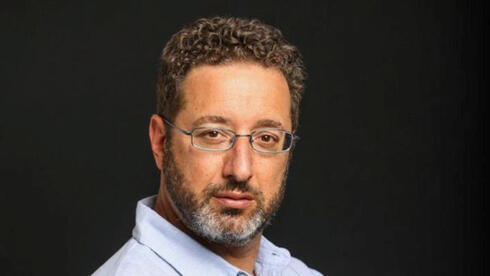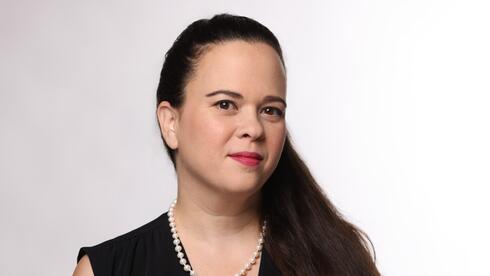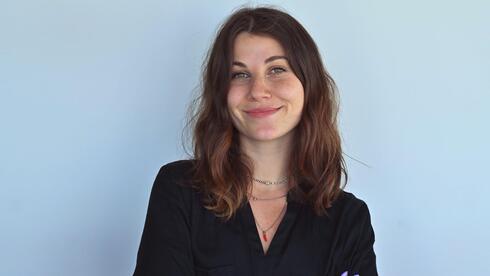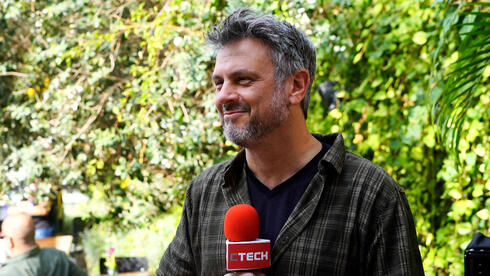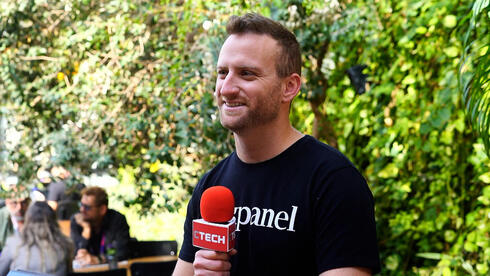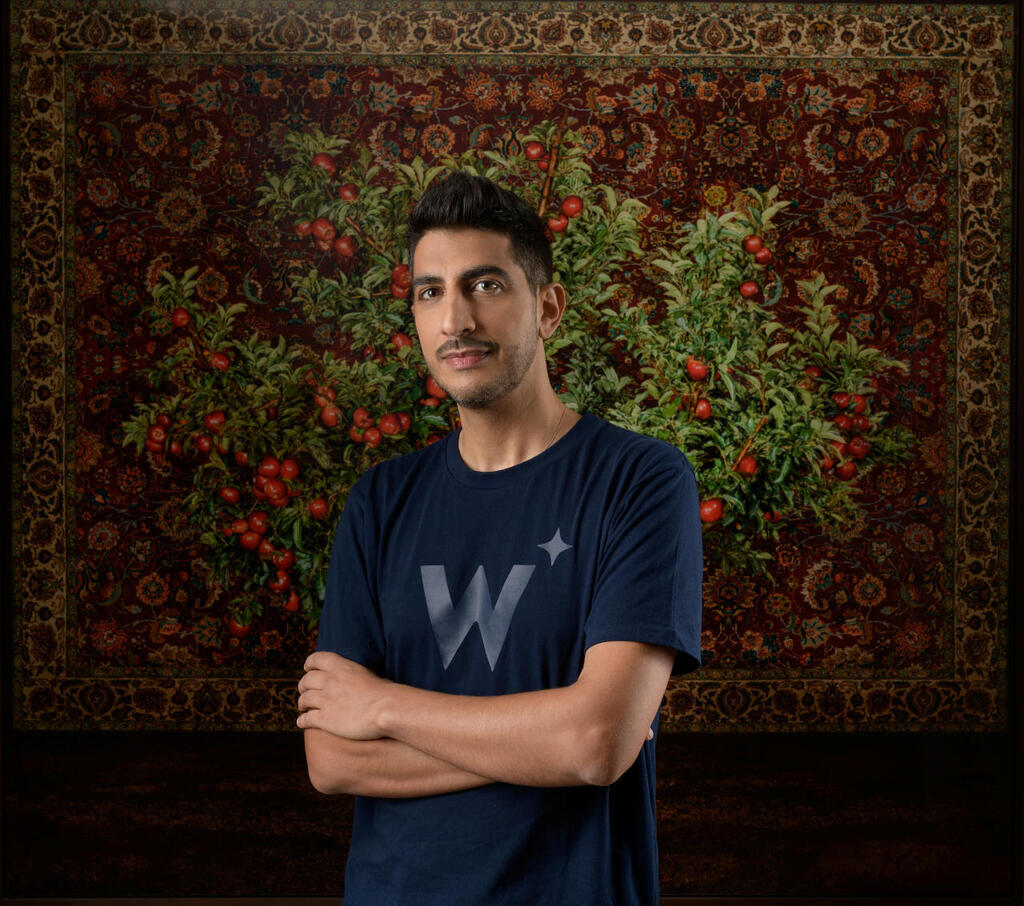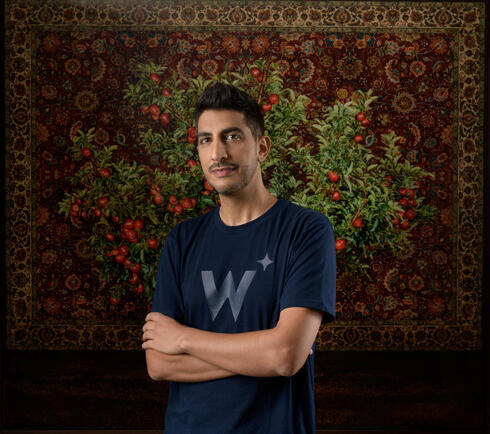
Wiz co-founder: "We are still at the expansion stage and we will transition to profitability when we decide to do so"
Wiz co-founder: "We are still at the expansion stage and we will transition to profitability when we decide to do so"
Yinon Costica, co-founder of Wiz, explains how the world's fastest growing cyber unicorn was created; why he is not threatened by Nir Zuk and Gil Shwed; why his company is determined to stand at the forefront of the resistance to the judicial coup; and how, as a gay man, he realized he has to stand by other minorities
Wiz set two precedents in February of this year. The first was raising $300 million based on a company valuation of $10 billion – far higher than the no-less phenomenal $6 billion valuation given to the Israeli cyber startup in the previous investment round. At a time when venture capital funds have significantly slowed their investing in companies, and when startups avoid raising capital so as not to expose a reduced valuation, Wiz raised a huge amount of money and was close to doubling its value.
The second precedent was its public statement, concurrently with the notice on the capital raising, that the $300 million would not be brought into Israel "because of the judicial coup". This notice was another active step taken by the company, which positioned itself at the forefront of the protest against the government's moves as soon as the latter began promoting the legislation to change the regime in Israel.
"I see it as my duty to our employees to express a stand and sound the alarm in the face of a material threat, and there is such a threat now,” says Yinon Costica (40), one of the four Wiz founders who have been working together for 20 years now, in an interview to Calcalist.
When did you realize you had to ring the alarm bells?
“When legislative bills were made to revoke anti-discrimination provisions. The sponsors of the bills belittled their significance at the time, saying ‘it’s specific’, or ‘it’s related only to religious faith’, but when the government of Israel says it’s about to revoke the principle of non-discrimination, which is the fundamental basis of our human rights, we realized that a red line had been crossed and we reacted immediately.”
Wiz then announced that all of its suppliers would be required to sign a document agreeing not to discriminate against any customer on grounds of sex, race, religion or sexual orientation. “Discount Bank also reacted (announcing it would not give credit to businesses which discriminated against customers), but we were still just a few businesses,” says Costica. “In retrospect we were not wrong, because it heralded what was yet to come. Some things are so deeply offensive, red lines that cannot be crossed, and you must sound the alarm when that happens.”
And still, there are those who would say that you should not be applauded for leaving $300 million out of Israel.
“I see it differently. Missiles are about to strike Israel and Wiz is sounding the alarm, saying ‘be careful, they’re coming’. What creates the panic, the alarm or the missiles fired at Israel? The missiles are the problem. It pains me when accusations are made at those who try to caution, because we are here and we are supporting Israel. Most of the entrepreneurs I know don't sleep, work 24/7 and do it from Israel, even though they have to travel very frequently. There is no country in the world that would not leap at the chance of having a company like Wiz, but we all want to be here.
"However, without democracy, high-tech will not be able to thrive here. We rely mainly on foreign investor funds and our customers are international. If the talent, which has always been the greatest challenge, will not be in Israel, all of this may fall apart.”
The money you left in banks overseas could have contributed to the Israeli economy. Are we not punishing ourselves?
"Wiz has a significant responsibility to its employees and investors, and transferring funds overseas is reasonable risk management, which is part of our responsibility. It happens where situations of uncertainty or instability emerge, such as when the war in Ukraine broke out, and this is even before taking any ideological stand. This is certainly the case when virtually all the market leaders and bank CEOs turned to Netanyahu with the message that the reform must be stopped. I'm glad that there has been a broad awakening beyond the high-tech community. I'm glad that people are taking a professional stand, expressing it in public and are not afraid to speak up.”
What red line would cause you to relocate not only the funds raised, but also the business out of Israel?
"This is a question that is so painful to me, that I don't want to deal with it. I don't want to reach a point where I have to think about that red line, because it brings me to tears. We need to fight for our right to build here what we conceive as an Israeli enterprise, an enterprise which is the cornerstone of the global economy – and I will fight for the ability to keep doing so from Israel. We manage a $10 billion company, which is very complex in itself, and still our major anxiety is about what is going on in Israel, and it is this which caused us to launch the protest at a very early stage.”
Is this view also taken around the world?
"I recently returned from the World Economic Forum in Geneva. I met CEOs and tech leaders, most of whom don't know Wiz specifically and know nothing about the stand it is taking. But when they heard we were from Israel, they asked me 'What the hell is going on over there?' The Israeli brand has always been so amazing and envy-provoking in the global high-tech scene, a country that has all the talent and gains unprecedented investments. They asked me: ‘how can you throw it away’?
"High-tech flourished under governments headed by Benjamin Netanyahu, until the current event began. Every day this event goes on aggravates the damage, because people are saying 'something bad is going on over there'. After all, everything in life is based on trust. Trust in the 'Israel' brand was the highest ever until November 2022 – and since then it's been experiencing a free fall. And this fall is the result of a breaking and ripping of the trust.”
If the judicial coup stops, is the situation reversible?
"The economic damage is tangible and has already been caused. I hope we will know how to fix things and restore the world's faith in the Israeli economy.”
Is there any way the $300 million will come to Israel?
"That is the outcome I long for. I think we can still get back on course and fix things.”
"A team, not a product"
Wiz's poster boy is usually Assaf Rappaport, one of the founders and the company's CEO. However, for the current interview he just passes through the corridor and waves hello through the office's transparent walls. The four founders have been working together in the high-tech industry for 20 years now, and apart from Rappaport and Costica (the company's VP Products), the quartet includes Ami Luttwak (CTO) and Roy Reznik (VP R&D).
In 2013, after serving in the IDF, the four were released from unit 8200 and founded Adallom, which provided security for organizations using cloud services. By 2015, Adallom was already sold to Microsoft for $320 million. They continued together in the R&D center of Microsoft Israel, until leaving in 2020, when they founded Wiz. Wiz's product allows organizations to gain a quick snapshot of security risks and weaknesses in their cloud environments, including an in-depth analysis of the network structure, access authorizations and loopholes which may be taken advantage of by hackers. The track record of Wiz's founders helped Wiz to be welcomed with open arms by venture capital investors. Only one year after its founding it became a $1.7 billion unicorn, and since then its valuation has kept rising.
Assaf Rappaport once said that there is no such thing as a 'startup idea' but only a 'startup team', because an idea isn't worth much without a team.
"When we founded Wiz we had nothing like this in mind,” Costica recalls the original idea on which the company was founded, which was security for cloud databases. "We even had another name for the company, Beyond Networks. It only shows how utterly different our direction was, to the point that we had to change the name. Wiz shifted to focusing on security for the actual cloud, and fortunately for us the investors didn’t make a big deal out of it. They said that they trusted the team and didn't turn it into a crisis.”
Who was the first to alert that the product was off-track?
"Our VP of Product Strategy, Raaz Herzberg, who is a real star. She listened to the conversations and raised the flag. She said to us: ‘I don't understand what significant problems the product solves for customers and why this is important’. This is a testament to the company's culture, where someone who had only just joined us, allowed herself to pose difficult questions, and others listened to her as an equal. It just goes to show how important diversity is for a company, because had she come off our production line – she would have thought like we did.
"This is also the reason why so many startups emerge from the Intelligence Corps, which has a culture of a duty to caution against wrong conceptions. This is exactly what I think about public life. If you think that something is wrong, it is your duty to say so. And it is the other side's duty to listen, especially when it is so painful for a large population.”
Cyber long-timers such as Gil Shwed or Nir Zuk actually refrained from speaking out in public.
"Who am I to criticize the considerations of people of their standing?"
Let's talk about Check Point. This is a mega company, which has been around for 30 years, generates $2 billion a year, with a profit of hundreds of millions of dollars, and a value of some $17 billion. Why does it make sense that the valuation of Wiz, which has been around for three years and is yet to make its first shekel of profit, should be valued at $10 billion?
"Check Point is an incredible company, a pioneer which built up Israel's first major cyber company. I'm highly appreciative of what Gil Shwed has done there, but there is room for many more successful cyber companies. It just shows how big of a potential Israel still has. It's true that Wiz has existed for three years, but it embodies the experience of a team that has been working together for more than 20 years. In our case this speed demonstrates how quickly the world can now adopt new solutions.”
2 View gallery
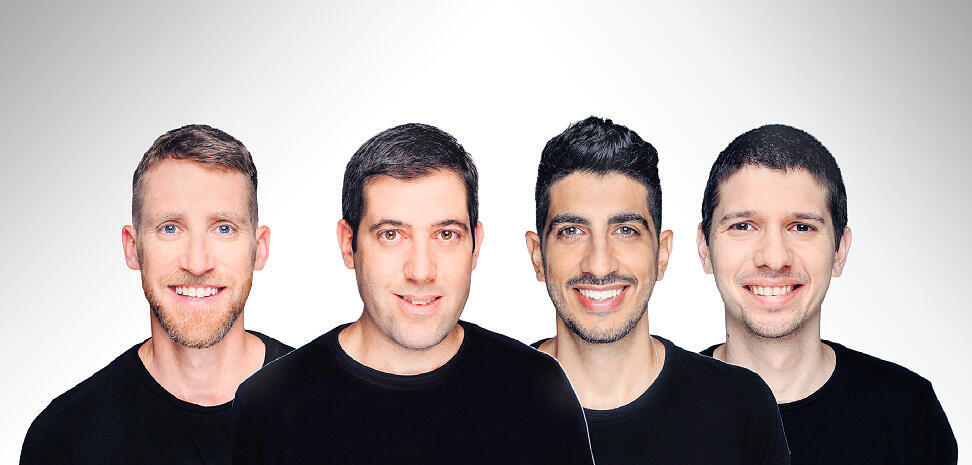

Wiz co-founders Assaf Rappaport (from left), Ami Luttwak, Yinon Costica and Roy Reznik.
(Photo: Orel Cohen and Nethanial Tobias)
There is an inflation of cyber companies, the market is flooded.
"There are many areas in which cyber presents potential for success: network, identity, cloud. Check Point is an essential component of any network set up by an organization. Wiz makes essential components that provide a pivot for the cloud. Just as I needed a Check Point firewall for my network, I need Wiz for my cloud.”
A pivot worth $10 billion?
“The market determined our value, and the last financing round indicates that the growth is continuing. This is not our statement, but rather a very significant vote of confidence in the Wiz team by the market. Until now we have proven that we have grown responsibly, unlike companies that grew quickly and were forced to change course. We have proven that our management is responsible in terms of risk-taking, and the sales figures back up the growth in value. Our product is positioned at the forefront of cloud security, and investors realized that if they had to bet on one player in the market, that player would be Wiz.”
Shwed has announced that Check Point will not be raising salaries this year, but will instead distribute options. Does this give you an advantage in the war for talent?
“The ability to bring in the best was and remains the biggest challenge in which we invest the most energy. And yes, we fight. The beauty of the fight for talent is that people choose where to go not only based on salary but also considering organizational culture and the possibility for self-fulfillment.”
What about Zuk, founder of cloud security giant Palo Alto? In an interview with Calcalist after your previous financing round he said: “If Wiz is worth $6 billion, we are worth a trillion”. Do you consider yourselves a competitor of Palo Alto’s Prisma, and are you maybe risking that they might try to take you out?
“They have an excellent product, used by a huge number of organizations, and we can learn a lot from them, not only on cloud-related domains. But our product is simpler to use and allows organizations to receive immediate value from the moment of connection. What customers like about Wiz is the accuracy of the results, the ability to democratize information security and help the development teams to assume ownership, rather than leaving it to the information security people only. The fact that two Israeli companies are leaders in this field is a tribute to Israel and I am proud to be competing with them for the market.”
According to Wiz’s forecasts, its sales will reach $200 million this year. In the last financing round, the existing investors (Sequoia, Index, Insight Partners and Cyberstarts) were joined by new investors, including Lightspeed and Greenoaks. The company employs some 700 employees, 200 of whom in Israel, and it says its product is installed at more than 35% of Fortune 100 companies.
According to certain metrics you are the largest cyber unicorn in the world, but you are still not committed to the profitability of companies in the real world.
“If in three years you reach $200 million in sales, and one third of the large companies in the U.S. use Wiz, this attests to the uniqueness of the product. We have both significant revenues and extensive use, and this should be kept in mind when talking about Wiz’s value.”
And profits?
“There is a trade-off between continued growth and profitability. It’s a decision. This market requires innovation and development, and we are still at the expansion stage. We will transition to profitability when we decide to do so.”
You raised capital before using up the money from the previous financing rounds, and you still have lots of reserves. Does this mean you are looking at acquisitions?
“We have never acquired a company, but if there was an opportunity to acquire teams that complement and expand us, we would welcome it. We are actively seeking opportunities to grow and meet with teams for this purpose. One of the things that interests us, for example, is early prevention of security vulnerabilities, as early as the cloud development stage. If a team comes along with a brilliant idea, this could be an incredible opportunity. But the primary aim is to build the company up organically. Acquisitions are a bonus.”
Is there a public offering on the horizon?
“Certainly, but we are in no hurry. The last round of financing just allows us more time to plan for it, and we will be able to make the decision when the time is right for us.”
“My mother’s rebellion spurred me on”
Costica was raised in Tel Aviv by an Algerian-born mother and a father of Syrian descent. His mother immigrated with her family to France, and at the age of 21, after completing a degree in electrical engineering, immigrated to Israel by herself and worked in the telecom sector. His paternal grandfather immigrated to Israel from Damascus and was one of the founding members of the Mista'arvim unit of the Palmach. The surname Costica was originally Costa, “and was probably changed on the way to Syria to make it sound less foreign”.
Costica represents the new generation in high-tech: an activist generation which feels that personal life and business life cannot be separated. In November he married his same-sex partner, Roy Katz, in a large wedding that included a performance by Sarit Hadad, whom he invited, and a surprise performance, courtesy of his friends, by Noa Kirel. “Roy is a designer, I love art and design, the relationship grew from there and recently we got married. He is the love of my life, and the wedding was the happiest day of my life,” he says.
You come from a traditional family.
“Right, but at the end of the day, everyone in my family wants me to be happy, and that is what matters.”
Your brother Yotav is the investment manager at MORE Investment House, your younger brother Yaniv is a development manager at a startup. Who pushed you all to achievements in STEM fields?
“The readiness to work hard, put in the effort, and excel came from home. My mother always said that as a female Jewish student in France, she always felt that she had to be No. 1 so that nobody would have a reason to replace her with a man. She lives with a sense that as an engineer she has to be the best.”
Was she your inspiration?
“As a child I didn’t fully appreciate her story, but now obviously I see her as a hero. She entered the then-male-dominated world of engineering alone, she immigrated to Israel alone right after her studies, at the age of 21, leaving everything behind, including her parents, brother and sister. She simply packed up her bags and immigrated to Israel, believing that Jews should live here. Later, some of her extended family moved to Israel, but for most of our childhood she was here alone, and we would travel back and forth to France to stay in touch. Immigrating from France to Israel in the early 1970s was a form of rebellion and her parents were of course angry, but that rebellion came from a recognition that Jews should live here.”
Did your traditional family not see your choice to marry a man as a form of rebellion?
“I have always done what I felt to be the right thing to do. In my family, tradition is something that unites us and brings us together. If the value that tradition serves is being together as a family, then I am continuing the tradition of family, albeit not in the conventional sense.”
What does she think about your professional journey?
“She wants me to find time for myself. Family is very important to her, and to me. We have an unwritten agreement that I don’t work on holidays and Shabbat and we visit the parents. If I miss a Friday night dinner because of work then I’m rightly shown a yellow card.”
What effect has your upbringing had on you?
“I remember, for example, that I didn’t want to take the high-school matriculation exam (Bagrut) in physics because I already had enough credits with good grades in my stronger subjects. It was a weaker subject for me, and I was hard on myself. Childishly, I didn’t want to take the exam if I wouldn’t get 100 like in the other matriculation exams. I clearly remember how my parents sat me down at the table and said: “Take it for us and do it”. Together they pushed me. They told me it’s easy to give up, but that you shouldn’t take the easy way out. They pushed me to go the extra mile, and made sure that I realized my potential. It really helped me and enabled me to later interview for the IDF's Talpiot program. To my mind, it is the parents’ responsibility towards their children, to push them to realize their potential.”
“We are very grateful to Assaf”
The IDF's Talpiot program was where the founding quartet came together. Costica recounts that “on July 16, 2001, our enlistment date, I met Assaf Rappaport and Ami Luttwak. We studied together in Talpiot, a very long and serious 3-year course of military study and training. Assaf and I were roommates in Jerusalem, and when we were placed in units – all three of us in 8200 – we happened to work together. That is where we met the fourth partner, Roy Reznik. This was a defining period, because cyber was still in its infancy and they had us kids build up the technology of the future. I cannot go into detail but during the Second Lebanon War we really felt that capabilities that we had built had an impact on the battlefield.”
When did you each begin moving into the roles you still hold today?
“When we founded Adallom, each one of us took on a role. Assaf took on the role of business leader, setting a high bar and ensuring everybody achieved it. Ami was the one who looked ahead in terms of the technological vision; Roy understands how to build a team that makes things happen; and I bring the ability to build the product to market fit. You don’t choose your family, but you do choose your team. I chose who would be on my team, and we have been together for 21 years, which is quite some time. We have considerable trust between us, and we are very close friends. We have already celebrated all of the holidays together, including with my family in France.”
Does the fact that Assaf is the frontman and in charge of all of the big decisions not create jealousy?
“On the contrary, we are very grateful to him. For most of us it is unnatural to be the frontman. Assaf is good at making brave decisions and I am grateful that I don’t have to. We couldn’t have established such a company without him and without his presence, and it is natural for us as a team that he takes the lead.”
Like Costica, Rappaport also lives with his same-sex partner. When they worked at the Microsoft Israel R&D Center, the company announced that it would support same-sex couples and single parents wishing to undergo surrogacy overseas with funding for this purpose, and at the same time supported the war on violence against women, so Wiz’s current activism is a direct continuation of past activity.
As a gay man, have legislative bills such as the bill allowing discrimination in service-giving on grounds of conflict with religious faith made you feel threatened?
“The events that occurred here in recent months have shaken me because I realized that this was something that could genuinely hurt my rights. It is distressing to fear that Israel might become a place where I am not welcome. The fact that I belong to a minority group which may be threatened makes me develop empathy towards Arabs or women or any person who may be threatened by oppressive power. I am therefore glad that Wiz has taken a clear stand against the calls for discrimination, and I will fight for equality and inclusion for every person.”
What about personal dreams for the future? Buy a yacht? Raise children? You will very soon be an 'old man' by high-tech standards.
“As time passes I feel able to invent more, do more, and contribute more to the creation of a safe world. I feel that the sky's the limit, that the market is hungry for solutions, and I want to see us continuing what we have built in the last 20 years. Of course I want a family, but I don’t know many people in high-tech for whom a yacht is truly the dream. What drives us is using business power to have a positive impact on the world.”




